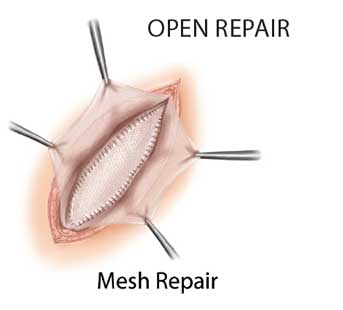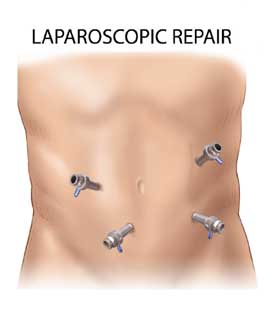Hernia surgery today is much more advanced than even five years ago. The use of laparoscopic surgery techniques and the newest, lightweight meshes (if needed), often allow patients to heal faster, in less pain, and have a more cosmetic outcome.
Patients who are deciding on where to have hernia surgery should make sure that their surgeon has all the tools available to offer the most state-of-the-art techniques and mesh to their patients. In addition, selecting a surgeon who tracks his or her outcome data and then publishes that data for future patients to see will help you have a statistically better chance of having a desirable outcome after your surgery.
Hernia surgery can be described based on three specific categories:
- Where the hernia is located: inguinal hernias (groin hernia), umbilical hernias (belly button hernia), as well as less common incisional, femoral and ventral hernias
- How the hernia is repaired: traditional open repair or laparoscopic
- They can be further classified as: unilateral (one side of the body), bilateral (both sides of the body), or recurrent (after a prior surgical repair)
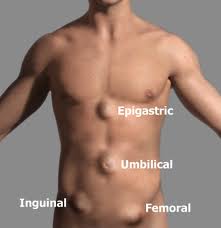
Open versus Laparoscopic Hernia Surgery
The two major types of hernia surgery are traditional open surgery, and laparoscopic surgery. No one approach is suitable for every patient. Patients with certain types of hernias may benefit from open hernia surgery while another similar patient may need laparoscopic hernia repair. The size of the hernia, the location, and whether it is unilateral or bilateral influences the best approach. Patients can read our:
- ‘Open Surgery‘ page
- ‘Laparoscopic Surgery‘ page
- ‘Comparison of Open & Laparoscopic Hernia Surgery‘ page
to read the pro’s and con’s of each type of surgery, as well as compare them to each other.
Tension Free Hernia Surgery
The term ‘tension free’ hernia surgery is commonly used to describe hernia surgery. Hernias are caused by a weakening of the abdominal muscles. Some surgeons choose to sew the muscles back together, thus causing ‘tension’ on the muscles around the hernia. However, the muscles around a hernia are already weak, and over time those muscles tend to pull apart and the hernia can recur, or come back.
Therefore, most hernia specialists today utilize a mesh to help strengthen the muscles after hernia repair. When using a mesh, the muscles themselves are not sewn together (see below). Instead, a mesh is placed over or under the hole in the muscle to prevent anything from pushing through the abdominal wall.
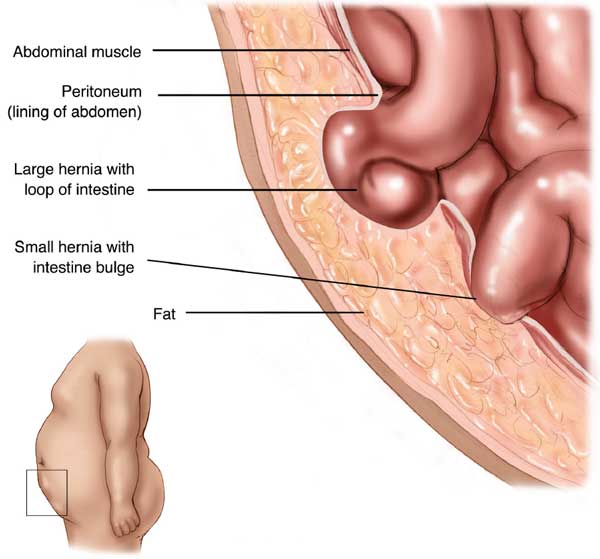
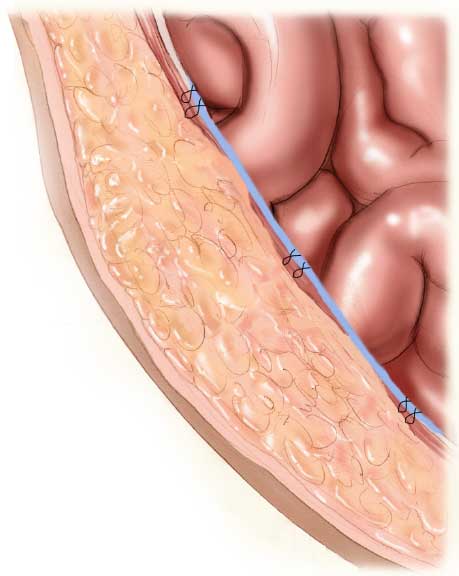
Some patients have heard or read negative information about mesh surgery. However, the unbiased government agency The National Institutes of Health performed a study of whether mesh should or should not be used for hernia surgery. Read the article by clicking on the logo to the right:
While there are some risks with any surgery, by utilizing the newest mesh available, these risks are minimized. Patients can read more on our ‘Truths About Hernia Mesh‘ page.
Our Approach
Dr. Harris specializes in surgical repair for all hernia types. For patients who require a laparoscopic surgery, Dr. Harris commonly performs these procedures. When performing a tension free mesh hernia repair, Dr. Harris uses the latest and most advanced lightweight mesh available which significantly reduces pain and discomfort after the surgery. Many surgeons still use mesh which was invented 10 or 20 years ago which can increase the chances of postoperative mesh pain. Today’s advanced mesh reduces those risks to almost zero. In addition, our center tracks patient outcomes after surgery including postoperative pain and recurrence rates and publishes that data for future patients to see. We feel that all patients should be able to choose a surgeon based on outcome quality and publishing our quality data helps us achieve that goal.
How To Choose a Hernia Surgeon and Center
Dr. Harris discusses what things to look for when choosing a surgeon for your hernia.Although basic open surgical hernia repair is still an important option for some patients, every patient should consider being seen by a surgeon who can perform advanced laparoscopic hernia surgery and who uses the newest lightweight mesh. Only a small handful of the hundreds of general surgeons in Orange County, Los Angeles, Riverside and San Diego have the experience to perform hernia surgeries using laparoscopic techniques and use cutting edge lightweight mesh.
Where Do You Go From Here?
Dr. Harris discusses what steps you should take to get your hernia repaired. He discusses how much hernia surgery costs and the next steps to getting you on the road to recovery.How Can You Minimize Recurrent Hernias and Complications?
Patients often cannot affect their risk of developing a primary (first time) hernia. However, patients can minimize the chances of having a recurrent hernia or chronic postoperative pain by choosing a surgeon who performs a high volume of hernia surgeries. Just like no one would want to fly with a pilot who only flies a few times a month, a surgeon who operates on hernias infrequently cannot provide leading care. In addition, finding a surgeon who publishes their surgical volume and outcomes data for future patients to review will ensure that you are choosing someone who can provie the outcome that you are looking for in a surgeon. Patients can read about our Hernia Patient Outcome Data here, or about recurrent hernias and complications from hernia surgery on our ‘Complications of Hernia Surgery‘ page along with how our center minimizes these risks.
What to Expect From Hernia Surgery
We know that visiting a doctor can be an uneasy experience. Most patients will (hopefully) only visit a few surgeons in their life. Not knowing what to expect and not knowing anything about the surgeon you are seeing can cause anxiety! We are extremely proud of our patient centered care and the experience our patients have with us. That’s why we encourage our past patients to give feedback about our practice and Dr. Harris. Whether this feedback is in the form of a letter, or on HealthGrades and Yelp, our past patients ease the anxiety of our future patients. In the videos below, some of our past patients discuss what their experience was like with hernia surgery at our center.
